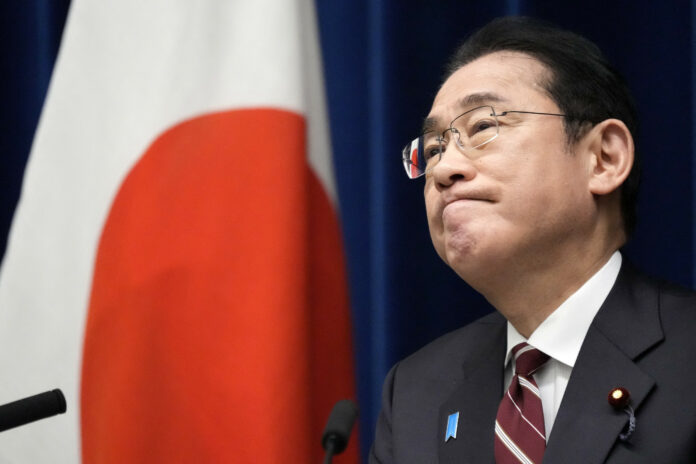When Japanese Prime Minister Fumio Kishida meets with President Joe Biden and Philippine President Bongbong Marcos in Washington, D.C., next week, he will undoubtedly make empty promises on clean energy and climate cooperation. Meanwhile, Japan will continue expanding fossil fuel development, endangering communities throughout Asia and around the world.
While the climate crisis requires a rapid transition to renewable energy, Prime Minister Kishida is prolonging our dependence on fossil fuels. Japan’s energy strategy relies heavily on liquefied natural gas (LNG), burning ammonia and hydrogen at coal and gas power plants, and carbon capture and storage. These technologies are insufficient to keep global warming under the 1.5 degrees Celsius threshold established by the Paris climate agreement.
Japan is sowing these insidious technologies throughout Southeast Asia utilizing a platform deceivingly named the “Asia Zero Emission Community (AZEC).” AZEC is nothing but a greenwashing ploy to support Japanese corporate interests under the guise of international cooperation.
Though Japan publicly committed to ending fossil fuel development abroad, behind-the-scenes it continues the expansion of gas and LNG across Asia and globally. Last week, Japan approved financing for the controversial Scarborough gas field in Australia and the San Luis Potosi and Salamanca gas plants in Mexico. Japan is also considering finance for the Block B gas project in Vietnam, despite the unjust jailing of climate activists.
Japan is one of the world’s top providers of public finance for gas, spending $4.3 billion on average each year from 2020-2022. In Southeast Asia, the Japanese government and megabanks have plowed $9.7 billion into gas projects over the last decade. The Japan Bank for International Cooperation (JBIC) stands out as the largest financier in the region’s gas development. Japan is the only G7 member that has failed to sign the Clean Energy Transition Partnership and has not supported restrictions on oil and gas financing at the Organization for Economic Cooperation and Development.
According to the International Energy Agency, there is no room for new gas investments in our effort to mitigate the devastating impacts of global warming. Gas is responsible for 22 percent of all greenhouse gas emissions from the burning of fossil fuels. Japan does not need all this gas as its demand is shrinking due to factors like increasing renewables and great potential in energy efficiency and will continue to decline.
Japan is using the energy transition as a pretext to create business opportunities for its corporations while continuing to rely on fossil fuels. The government and the private sector are developing gas infrastructure across Asia to sell Japanese technologies and excess gas.
One of their key targets is the Philippines, where the country’s first LNG import terminal was completed last year in the Verde Island Passage, a biodiversity hotspot. Atlantic Gulf & Pacific Company (AG&P) built the terminal in Batangas City with support from JBIC. This project has already harmed local communities and ecosystems.
Last December, a coalition of fisherfolk and local stakeholders filed a complaint alleging that JBIC failed to uphold its own environmental and social guidelines. AG&P is accused of violating national laws and regulations regarding tree cutting, land conversion, and environmental compliance. JBIC’s examiners have started a three-month investigation based on the complaint.
JBIC is also pursuing partnerships with the Philippines’ major fossil fuel conglomerates, including San Miguel Corporation, Southeast Asia’s biggest gas expansionist. In the Philippines, where experts have laid out a pathway for a 1.5 degrees Celsius-compatible transition to 100 percent renewable energy is possible, Japan’s push for gas risks a dangerous and costly detour.
EUGENE HOSHIKO/POOL/AFP via Getty Images
Fossil fuel projects also jeopardize the livelihoods and health of communities elsewhere. In Jakarta, Indonesia, experts estimate around 2,500 air pollution-related premature deaths per year, caused by coal power plants like Cirebon-1, also financed by JBIC. Replacing coal with another polluting fossil fuel, gas, is not the answer.
Japanese-financed LNG projects have also left a legacy of harm along the U.S. Gulf Coast. Over the last decade, Japanese public institutions like JBIC provided over 8.3$ billion for LNG projects, including the Freeport LNG terminal in Texas and the Cameron LNG terminal in Louisiana. Frontline communities have suffered from severe impacts on their health, livelihoods, and ecosystems.
The strong and growing opposition from frontline communities and climate activists led to the Biden administration putting a pause on new authorizations for U.S. LNG exports. Now projects like the massive Calcasieu Pass 2 LNG export terminal in Louisiana are on hold. Communities have stopped projects from Anova in Texas to Jordan Cove in Oregon and are working tirelessly to stop all pending LNG export projects and fossil fuel infrastructure. Further, strong Global South-led movements have emerged calling on Japan and rich countries to Don’t Gas Asia and Don’t Gas Africa.
The surest path to ensuring energy and climate security in Asia is the rapid, just development of renewable energy. Gas is expensive with the required infrastructure and volatile prices, and risky due to the growing international opposition. The path is especially clear in Southeast Asia, where there is currently twice as much renewable energy capacity than gas and LNG proposed, led by the Philippines and Vietnam. Japan threatens to lock this potential out.
Due to its enormous power and influence, Japan could become a leader in the climate movement by helping to increase the pace and scale of renewable energy development, rather than doing the opposite. If Prime Minister Kishida is sincere in his dedication to climate cooperation and securing peace and security in the region, he must end Japan’s financing of fossil fuel projects.
Gerry Arances is the executive director of the Center for Energy, Ecology, and Development.
Elizabeth Bast is the executive director of Oil Change International.
The views expressed in this article are the writers’ own.
Uncommon Knowledge
Newsweek is committed to challenging conventional wisdom and finding connections in the search for common ground.
Newsweek is committed to challenging conventional wisdom and finding connections in the search for common ground.


